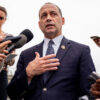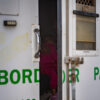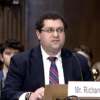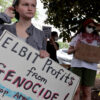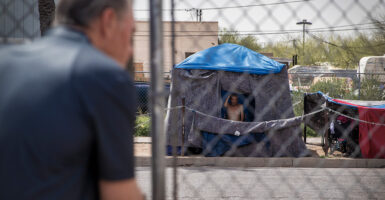Arizona’s two largest cities allocated tens of millions of dollars to fight homelessness in the past several years, but little has changed, according to a Goldwater Institute investigative report released Thursday.
“We’ve seen Phoenix and Tucson spend, combined, almost half a billion dollars on this issue with very minimal improvements in the area of homelessness,” Austin VanDerHeyden, municipal affairs liaison for the Goldwater Institute, told The Daily Signal.
The Goldwater Institute, a public policy research and litigation organization based in Arizona, launched an investigation into what Phoenix and Tucson officials are spending to address homelessness, who is receiving the funding, and the results of the investment.
Follow the Money
Phoenix reports allocating $140 million to address homelessness between July 2021 and March 2023. But since 2021, Goldwater Institute determined, Phoenix far exceeded this amount.
According to its investigation, the policy group determined that Phoenix “has allocated over $180 million to homelessness services since 2021 through a combination of federal, state, and local funding.”
Further investigation of some federal, state, and private funding budget line items for homeless solutions revealed that “over $250 million has been allocated to address homelessness in Phoenix since 2021, an astounding sum that has not moved the needle on the problem,” according to Goldwater’s report.
The result?
Following this investment in fighting homelessness, Phoenix reported in May that the “total population of people experiencing homelessness in Phoenix decreased by just over 1%, from 6,902 in 2023 to 6,816 in 2024.”
Goldwater calls the change “miniscule,” considering the “vast investment of taxpayer dollars.”
In Maricopa County, which includes Phoenix, the housed and unhoused homeless population was 6,298 in 2018 and has risen to 9,435 in 2024.
In Pima County, which includes Tucson, the Goldwater Institute found that a lack of organized public information made it challenging to determine how much the city is spending on homelessness, but the county reports spending between $50 million and $70 million a year on homelessness. This money comes through federal, state, local, and philanthropic sources, according to a 2023 report from a coalition called the Tucson Pima Collaboration to End Homelessness.
But Pima County estimates that to reach a “functional zero” homeless population, it would cost between $135.8 million and $158.5 million a year.
Pima County hasn’t released its 2024 report on homelessness, but in 2023, the county reported its homeless population at 2,209, a 1% decrease from 2022 but a 60% increase since 2018.
Goldwater’s investigation concluded that “spending for the sake of spending is not going to solve this issue,” VanDerHeyden said, adding: “Enforcing the laws that are on books, that’s what needs to be done now.”
The Homelessness Crisis
Like many other cities, Phoenix experienced an increase in homelessness during COVID-19. About 15 blocks in downtown Phoenix became known as “The Zone,” home to about 1,000 homeless people living in tents and makeshift shelters.
The Zone turned into an open-air drug market riddled with crime and the city, according to the Goldwater Institute, turned a blind eye to the homeless encampment.
Phoenix was forced to act when a group of local property and business owners negatively affected by the encampment sued the city for maintaining a “public nuisance.” Ultimately, the court sided with those property and business owners and the Goldwater Institute, which had filed briefs supporting their case. The court ordered the city to clear the encampment, which it did in the fall of 2023.
The “number of unsheltered individuals in Phoenix decreased by 19%, from 3,333 people in 2023 to 2,701 in 2024,” according to the city. That result, Goldwater Institute notes, came after the court ordered the city to clean up its largest homeless encampment in 2023.
In Tucson, the 100-Acre Wood Bike Park became the city’s biggest homeless encampment. Tents, tarps, and piles of garbage made the park look more like a Third World country than a recreational area in a U.S. city.
The local Southern Arizona news station KGUN9 reported in May that about 100 people called the encampment home, with many homeless individuals living in the park for over a year. The city cleaned a section of the encampment in May, but another local news station, KOLD, reports that the homeless are still living in the park.
Who Has the Money?
Phoenix entered into contracts with vendors that provide services related to the fight against homelessness. Combined, the contracts total about $180 million, according to Goldwater’s research.
A task force worked to determine which organizations should receive contracts and “four of the 19 members of the task force were associated with organizations that had contracts with Phoenix (Southwest Behavioral Health, Chicanos Por La Causa, Central Arizona Shelter Services, and Mercy Care),” according to the report.
“It is unclear how, if at all, the city addressed the potential conflicts of interest that could arise from vendors who provide homelessness services to Phoenix making recommendations on homelessness,” Goldwater notes.
Money allocated for homelessness in Pina County was more challenging to track, according to the report.
“Goldwater reviewed contracts and administrative expenses available on Pima County’s website in a further attempt to calculate spending on homelessness since 2021, including prevention,” the report explains. “According to this methodology, Pima County’s contracts with vendors totaled almost $27 million, including some administrative expenses between 2021 and 2024.”
“Phoenix has prioritized creating more indoor shelter than ever before in the last several years, adding 592 new permanent beds in 2022 and 480 temporary beds in 2023,” Kristin Couturier, Phoenix’s senior public information officer, told The Daily Signal.
The city plans to add an additional 790 permanent beds in 2024 and 2025, Couturier said.
“While we know shelter alone does not end homelessness, it is a crucial first step for many people to connect with the right resources and support to end their homelessness,” she said, noting that over the past year the city has increased its housed homeless population and decreased its unhoused homeless population.
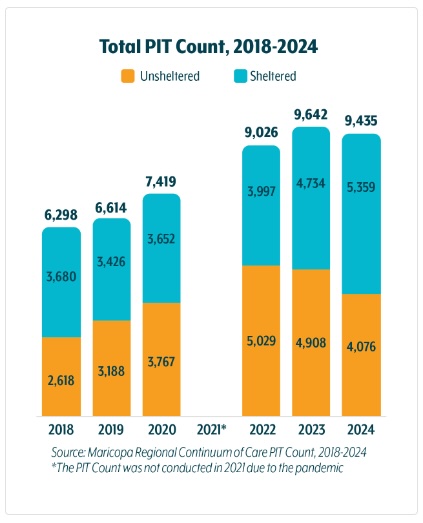
The Daily Signal asked the Pima County Office of Housing Opportunities & Homeless Solutions about the results of the $50 million to $70 million the county estimates it spends annually on homelessness.
Jenifer Darland of that office told The Daily Signal: “Pima County government as a funding recipient receives only a share of federal and state funding to address homelessness—approximately $3 million in U.S. Department of Housing and Urban Development (HUD) grants, and this year, approximately $4 million in state awards.”
A Path Forward
“Despite the enormous funds that Phoenix and Tucson have devoted to addressing homelessness, a permanent, sustainable solution appears elusive,” according to Goldwater’s report.
Both Tucson and Phoenix allocated COVID-19 relief funding to fight homelessness, a funding source that eventually will run dry.
“We don’t have all the money in the world. So we will have to make tough decisions,” Phoenix City Manager Jeff Barton told the City Council earlier this year.
In its report, the Goldwater Institute cautions against simply asking “where to find more money,” and instead suggests that leaders in Phoenix and Tucson should ask “whether funding alone, no matter how extensive, is the answer to homelessness in these cities.”
Voters to Have a Voice
Amid their state’s struggle with homelessness, Arizonans will have the opportunity to vote for a ballot initiative in November that would allow property owners to apply for a property tax rebate if the city or locality where the property is located doesn’t enforce the law and private property is affected as a result.
If the ballot initiative prevails, Arizona property owners could apply for a tax rebate if their property was affected by activity pertaining to “illegal camping, loitering, obstructing public thoroughfares, panhandling, public urination or defecation, public consumption of alcoholic beverages, and possession or use of illegal substances,” Ballotpedia reports.
This report was modified within minutes of publication to clarify that the Goldwater Institute filed court briefs in support of property and business owners’ lawsuit against the city of Phoenix.
